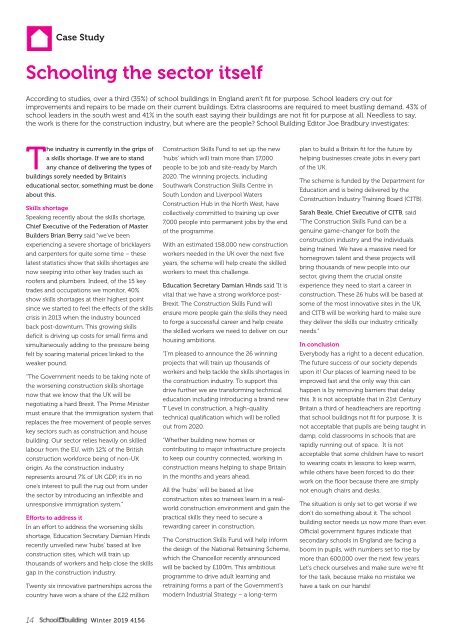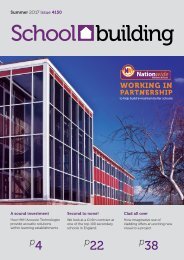SB 4156 32pp WEB
Create successful ePaper yourself
Turn your PDF publications into a flip-book with our unique Google optimized e-Paper software.
Case Study<br />
Schooling the sector itself<br />
According to studies, over a third (35%) of school buildings in England aren’t fit for purpose. School leaders cry out for<br />
improvements and repairs to be made on their current buildings. Extra classrooms are required to meet bustling demand. 43% of<br />
school leaders in the south west and 41% in the south east saying their buildings are not fit for purpose at all. Needless to say,<br />
the work is there for the construction industry, but where are the people? School Building Editor Joe Bradbury investigates:<br />
The industry is currently in the grips of<br />
a skills shortage. If we are to stand<br />
any chance of delivering the types of<br />
buildings sorely needed by Britain’s<br />
educational sector, something must be done<br />
about this.<br />
Skills shortage<br />
Speaking recently about the skills shortage,<br />
Chief Executive of the Federation of Master<br />
Builders Brian Berry said “we’ve been<br />
experiencing a severe shortage of bricklayers<br />
and carpenters for quite some time – these<br />
latest statistics show that skills shortages are<br />
now seeping into other key trades such as<br />
roofers and plumbers. Indeed, of the 15 key<br />
trades and occupations we monitor, 40%<br />
show skills shortages at their highest point<br />
since we started to feel the effects of the skills<br />
crisis in 2013 when the industry bounced<br />
back post-downturn. This growing skills<br />
deficit is driving up costs for small firms and<br />
simultaneously adding to the pressure being<br />
felt by soaring material prices linked to the<br />
weaker pound.<br />
“The Government needs to be taking note of<br />
the worsening construction skills shortage<br />
now that we know that the UK will be<br />
negotiating a hard Brexit. The Prime Minister<br />
must ensure that the immigration system that<br />
replaces the free movement of people serves<br />
key sectors such as construction and house<br />
building. Our sector relies heavily on skilled<br />
labour from the EU, with 12% of the British<br />
construction workforce being of non-UK<br />
origin. As the construction industry<br />
represents around 7% of UK GDP, it’s in no<br />
one’s interest to pull the rug out from under<br />
the sector by introducing an inflexible and<br />
unresponsive immigration system.”<br />
Efforts to address it<br />
In an effort to address the worsening skills<br />
shortage, Education Secretary Damian Hinds<br />
recently unveiled new ‘hubs’ based at live<br />
construction sites, which will train up<br />
thousands of workers and help close the skills<br />
gap in the construction industry.<br />
Twenty six innovative partnerships across the<br />
country have won a share of the £22 million<br />
Construction Skills Fund to set up the new<br />
‘hubs’ which will train more than 17,000<br />
people to be job and site-ready by March<br />
2020. The winning projects, including<br />
Southwark Construction Skills Centre in<br />
South London and Liverpool Waters<br />
Construction Hub in the North West, have<br />
collectively committed to training up over<br />
7,000 people into permanent jobs by the end<br />
of the programme.<br />
With an estimated 158,000 new construction<br />
workers needed in the UK over the next five<br />
years, the scheme will help create the skilled<br />
workers to meet this challenge.<br />
Education Secretary Damian Hinds said “It is<br />
vital that we have a strong workforce post-<br />
Brexit. The Construction Skills Fund will<br />
ensure more people gain the skills they need<br />
to forge a successful career and help create<br />
the skilled workers we need to deliver on our<br />
housing ambitions.<br />
“I’m pleased to announce the 26 winning<br />
projects that will train up thousands of<br />
workers and help tackle the skills shortages in<br />
the construction industry. To support this<br />
drive further we are transforming technical<br />
education including introducing a brand new<br />
T Level in construction, a high-quality<br />
technical qualification which will be rolled<br />
out from 2020.<br />
“Whether building new homes or<br />
contributing to major infrastructure projects<br />
to keep our country connected, working in<br />
construction means helping to shape Britain<br />
in the months and years ahead.<br />
All the ‘hubs’ will be based at live<br />
construction sites so trainees learn in a realworld<br />
construction environment and gain the<br />
practical skills they need to secure a<br />
rewarding career in construction.<br />
The Construction Skills Fund will help inform<br />
the design of the National Retraining Scheme,<br />
which the Chancellor recently announced<br />
will be backed by £100m. This ambitious<br />
programme to drive adult learning and<br />
retraining forms a part of the Government’s<br />
modern Industrial Strategy – a long-term<br />
plan to build a Britain fit for the future by<br />
helping businesses create jobs in every part<br />
of the UK.<br />
The scheme is funded by the Department for<br />
Education and is being delivered by the<br />
Construction Industry Training Board (CITB).<br />
Sarah Beale, Chief Executive of CITB, said<br />
“The Construction Skills Fund can be a<br />
genuine game-changer for both the<br />
construction industry and the individuals<br />
being trained. We have a massive need for<br />
homegrown talent and these projects will<br />
bring thousands of new people into our<br />
sector, giving them the crucial onsite<br />
experience they need to start a career in<br />
construction. These 26 hubs will be based at<br />
some of the most innovative sites in the UK,<br />
and CITB will be working hard to make sure<br />
they deliver the skills our industry critically<br />
needs.”<br />
In conclusion<br />
Everybody has a right to a decent education.<br />
The future success of our society depends<br />
upon it! Our places of learning need to be<br />
improved fast and the only way this can<br />
happen is by removing barriers that delay<br />
this. It is not acceptable that in 21st Century<br />
Britain a third of headteachers are reporting<br />
that school buildings not fit for purpose. It is<br />
not acceptable that pupils are being taught in<br />
damp, cold classrooms in schools that are<br />
rapidly running out of space. It is not<br />
acceptable that some children have to resort<br />
to wearing coats in lessons to keep warm,<br />
while others have been forced to do their<br />
work on the floor because there are simply<br />
not enough chairs and desks.<br />
The situation is only set to get worse if we<br />
don’t do something about it. The school<br />
building sector needs us now more than ever.<br />
Official government figures indicate that<br />
secondary schools in England are facing a<br />
boom in pupils, with numbers set to rise by<br />
more than 600,000 over the next few years.<br />
Let’s check ourselves and make sure we’re fit<br />
for the task, because make no mistake we<br />
have a task on our hands!<br />
14 Winter 2019 <strong>4156</strong>
















